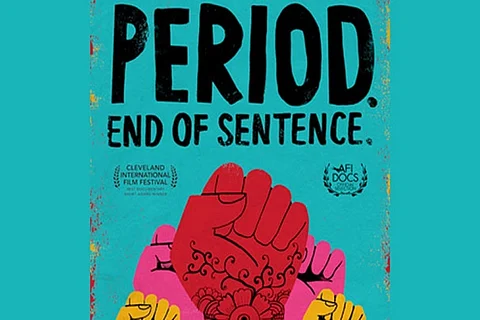

Asking a woman to talk about her periods whether in Hapur village or in any big city will cause embarrassed smiles and awkward silences. It’s shocking how little we know, or care to know about a bodily function that has been around since the dawn of time. It’s a vicious circle of silence where entire communities live in a state of denial of the process itself, and the problems faced by young girls and women without access to pads and toilets while they menstruate.
Period. End of Sentence, now streaming on Netflix and nominated for best documentary short at this year’s Academy Awards, aims to fight the various taboos associated with menstruation. The filmmakers travel to Hapur village, 60 km outside Delhi, where few women have seen or even heard of a sanitary pad. No access to sanitary pads during their periods causes girls to drop out of school and risk serious health problems. But when a sanitary pad manufacturing machine is installed in the village, one that creates affordable, biodegradable sanitary pads, it opens doors for conversations around a topic not discussed for decades and helps build a microeconomy in the village.
The low-cost pad making machine installed in Hapur village has been developed by Arunachalam Murugunantham (whose life inspired Akshay Kumar's Pad Man), who has made it his mission to create sustainable and affordable sanitary pads for women across India. Murugunantham’s model employs women from the village to operate the machine, and also go door to door initially to sell the pads, making it easier for women who otherwise find it awkward to go buy them from a shop. They earn a small amount from selling pads, giving their families an additional income, and some women funds to complete their education or pursue professional courses.
The documentary and the pad making machine have been funded by The Pad Project LLC, a non-profit corporation formed by students from Oakwood High School. Ruby Schiff, Avery Siegel and Claire Sliney, former students of Oakland High School who are Executive Producers along with some of their other classmates, have been collecting funds over six years, starting with bake sales and yogathons to a Kickstarter campaign in 2016. They then brought on-board award-winning director Rayka Zehtabchi to capture the onset of change in Hapur village.
The documentary begins with its core focus on the impact of poor sanitation and the usage of cloth on a young girl’s education once she starts menstruating. So great is the stigma associated around a girl’s period, that they are mortified and unable to speak a word when asked about it in school. The boys and men of the village are equally clueless, with a teenage boy from the village referring to it as a woman’s disease.
The film also touches upon other taboos and problems faced by a woman on her period. Not going to a temple since you’re "impure" and your prayers will not be fulfilled in that impure state, and the dangerous ways they dispose blood soaked rags while avoiding anyone seeing them are just some of the monthly issues they face.
While there is a desperate need for a solution to these problems, how do you get women involved and talk to them about something they refuse to acknowledge that they want or need? By changing the associations to the problem. There is a glimmer of hope in the form of a few women like Sneha, Shabana, Suman and Rekha who come forward to assume leadership roles in the course of the film.
“Change takes time in a patriarchal society but it will happen,” says Suman, who is shown assuming charge at the pad making unit, maintaining work timings and records of stocks. Sneha, who aspires to be an IPS officer, rejects the notions of impurity associated with women on their period.
“If the goddess we pray to can be in the temple all year around inspite of being a woman, why can’t we worship at any time of the month?” she asks.
Shabana, who works with an NGO and has been counselling women in the village about safe period practices, is hopeful of big change once women start coming on their own to buy pads regularly.
Cinematographer Sam Davis and director Rayka Zehtabchi choose comfort of the interviewees over technical perfection in framing shots and interviews to make their subjects comfortable. The absence of artificial lighting helps with both realism and symbolism - reflecting the daily living situation of families where electricity is unreliable, and the metaphorical darkness of ignorance and shame that they overcome. There are heartwarming scenes of women buying their first ever sanitary pads, and the ones selling them earning their first ever incomes.
In an additional sign of hope, the documentary shows the men in the village also take an interest in the pad making plant, trying out the machines and speaking to the women there about what they are making. The thought that kept popping up in my mind as I watched this film was, menstruation is not a new occurrence or a lifestyle choice. Then why do we make such a big deal of it? Why does every generation of women inherit a legacy of self-loathing and shame associated with it? As someone who has grown up using sanitary pads, it was moving to see women and girls touching and unwrapping a pad for the first time in their lives.
The women of Hapur have named their sanitary pads Fly, hoping that their little unit will help women in their village to soar. The pad making plant is changing the perception of menstruation from something shameful to a source of dignity and pride, and one can only hope that these low-cost pads soak up any remaining misgivings their village may have.